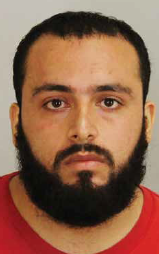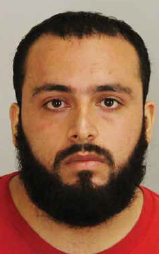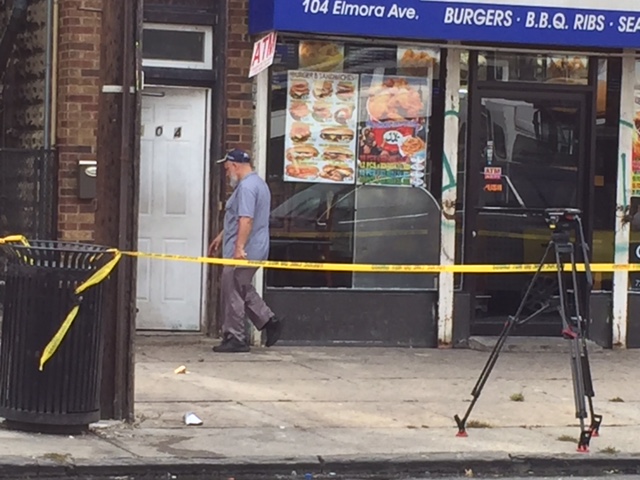
Elizabeth—The day certainly dawned more peacefully on Tuesday, September 20, than the previous two days in Elizabeth, N.J.
As news of an explosion unfolded in Manhattan’s Chelsea neighborhood Saturday night, following others in Seaside Park, N.J., the NYPD and FBI worked feverishly through Sunday to gather information that ultimately connected the bombings. An undetonated bomb was also discovered four blocks away from the Chelsea crime scene. Several men in Brooklyn were taken in for questioning, and by early Sunday the photo of the prime suspect was already being circulated.
Fast forward to 8:45 Sunday evening, when two homeless men reported to Elizabeth police that a backpack in a trash can near the train station appeared to have wires protruding from it. The Elizabeth police immediately contacted the Union County Bomb Squad, which dispatched its unit with robotics and contacted the FBI. The area was cleared and further searches were conducted to identify other possible devices, while the bomb squad moved the backpack to a safe area for inspection by the robotic equipment. The drones quickly determined the likely presence of an explosive and safely detonated the device. No people were nearby and no one was injured.
In the early hours of Monday morning, as administrators and rabbis in the Elizabeth community were preparing for what they thought would be their usual morning routines, they became aware of what had happened during the night, so frighteningly close to the Jewish community and local schools. Steve Karp, executive director of the Jewish Educational Center schools, in the midst of morning davening, with tefillin still on his head, received a flurry of emergency text messages from the community rabbis and immediately called his contact at the Elizabeth police department, Captain Giacomo Sacca.
Sacca also serves as the head of Elizabeth’s “SWAT”-type team, and he assured Karp that every school campus, including the yeshivot, had been swept by the police during the night and that the public schools were opening. Based on this and other information, Karp decided to open the JEC schools, but with limitations and enhanced security. They also agreed that all such decisions going forward would be made in a coordinated effort.
Karp worked with security and maintenance personnel at all of the JEC schools to repeat a sweep of the campuses. Robert Hart, the JEC controller, dispatched a request to the Securitas company to double the security to each school. Next, the school principals conferenced to make decisions about the structure and conditions of the school day, set up their plan of higher visibility on each campus, and communicated with parents and staff about the plan. They mobilized and assigned administrators—including themselves—to every parking lot and auto access point in each location to facilitate the safe arrival of faculty, staff and students. Karp stated that he personally inspected the riders and driver in each vehicle, and the lots were monitored throughout the day.
Emails written by the principals were sent to parents of each of the three schools. At this point, the necessary safety features and plans were in place and the school day began without incident. However, deep concern remained as the identity of the alleged bomber revealed him to be an Elizabeth resident who remained at large, and was considered armed and dangerous.
Karp noted that two-way radios are now in each classroom to augment the already sophisticated emergency communication capability in the lower school. A one-touch system alerts the administrators of a problem in any classroom, and touchless communication can continue afterwards. There is also a protocol, training and manual for handling emergencies, and the schools conduct monthly fire and security drills. The schools have internal and external video monitors and safety lighting at night, and now the school employs permanent armed guards, in addition to the regular security.
Elizabeth Mayor Chris Bollwage spoke to The Jewish Link about the collective municipal and other agency responses to this incident. The mayor was present when the device exploded as it was being probed by the bomb squad robot, which was damaged. He credited all of the first responders and coordinated efforts of every agency, from the Elizabeth police, to EMS and fire departments, and including the Union County sheriff’s office and bomb squad, the N.J. state police and prosecutor, the U.S. attorney’s office and the FBI. He noted they focused initially on community safety, but they also had to be concerned with preserving as much evidence as possible. He acknowledged everyone’s above-and-beyond professionalism.
The mayor also credited the NYPD for procuring a photo, which proved to be crucial in identifying the suspect and ultimately led to his capture. Further coordination by the Linden police, who took the suspect into custody after a firefight in which two officers were wounded, and later the FBI and others brought the search to a successful conclusion. A collective sigh of relief and appreciation reverberated across the area.
Mayor Bollwage also added that the two homeless men who initially alerted police to the backpack in Elizabeth would be formally thanked in both city and state ceremonies. A GoFundMe page for the two men had already raised $12,000 by press time.
Without exception, everyone interviewed expressed profuse appreciation for the efforts, actions and professionalism of all involved in the unified community effort that thankfully concluded without loss of life.
By Ellie Wolf











